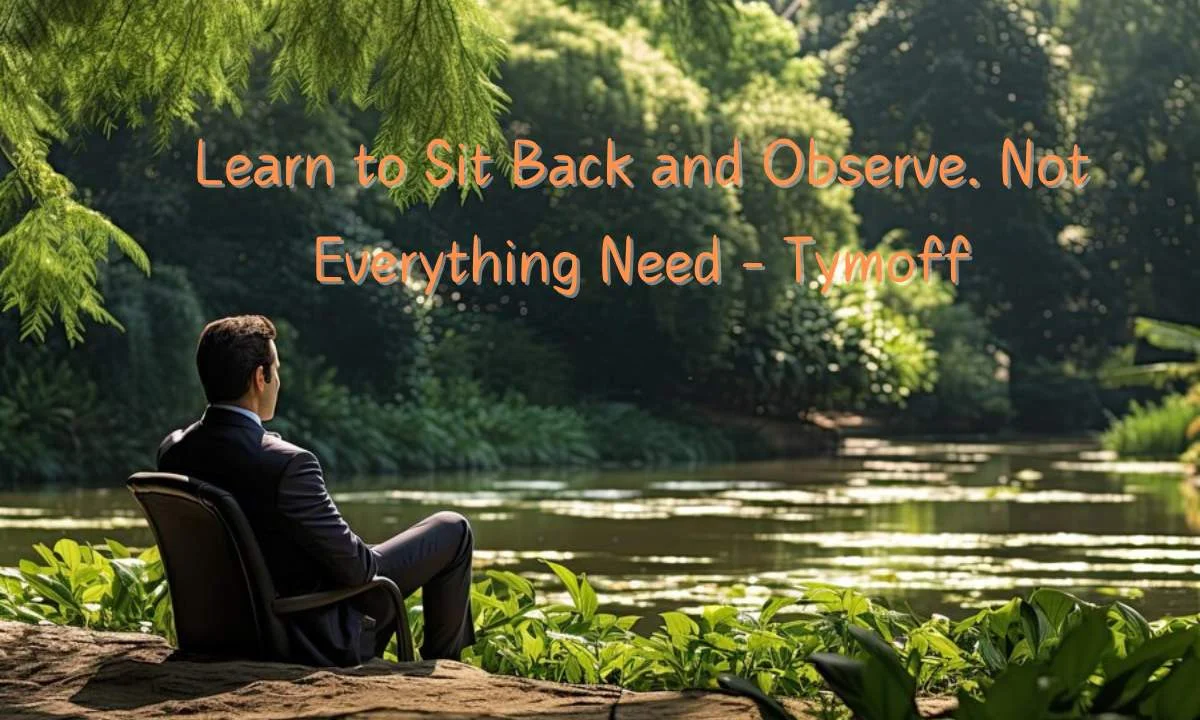learn to sit back and observe. not everything needed – tymoff

Introduction learn to sit back and observe. not everything needed – tymoff
Are you constantly caught up in the hustle and bustle of life, rushing from one task to another without a moment to spare? In today’s fast-paced world, it’s easy to get swept away by the demands of daily life. But what if I told you that sometimes, the most valuable thing you can do is simply sit back and observe? Join me as we delve into the art of learn to sit back and observe. not everything needed – tymoff your immediate attention or reaction.
The Importance of Observing
Observing is like having a front-row seat to the world around you. It’s about taking a step back and truly seeing what’s happening, without jumping to conclusions or getting caught up in the moment. By observing, you can gain valuable insights and understandings that may have otherwise gone unnoticed.
The importance of observing lies in its ability to provide a deeper understanding of situations, people, and even yourself. When you observe with an open mind and keen eye, you can pick up on subtle cues and nuances that reveal more than meets the eye. This skill can help you make better decisions, improve relationships, and navigate life with greater clarity.
Whether it’s watching how people interact in a social setting or noticing patterns in your daily routine, observation allows you to gather information passively without actively participating. This passive engagement can be incredibly empowering as it gives you time to process information before reacting impulsively.
In essence, observing is not just about seeing but about truly perceiving the world around us. It opens doors to new perspectives and insights that can enrich our lives in countless ways. So next time you find yourself rushing through life’s moments, take a moment to sit back and observe – you might be surprised by what you discover.
Benefits of Sitting Back and Observing
Observing from a distance allows you to gain valuable insights that may be missed during action. By sitting back and observing, you can see the bigger picture and notice patterns that reveal themselves over time. This perspective can help you make more informed decisions and avoid impulsive reactions.
Furthermore, taking the time to observe can enhance your understanding of people and situations. You may pick up on subtle cues, body language, and emotions that provide deeper insight into what is truly happening beneath the surface. This heightened awareness can improve your relationships and communication skills.
In addition, practising observation helps cultivate patience and mindfulness. Instead of rushing to judgment or jumping to conclusions, you learn to pause, reflect, and gather information before responding. This mindful approach leads to more thoughtful actions and better outcomes in various aspects of life.
How to Practice Sitting Back and Observing
To practice sitting back and observing, start by finding a quiet spot where you can simply be present. Take a few deep breaths to centre yourself and let go of any distractions. Focus on the environment around you without judgment or analysis. Notice the details – colours, sounds, smells – that often go unnoticed in our fast-paced lives.
Engage your senses fully by tuning into what is happening in the present moment. Allow yourself to let go of any urge to react immediately and instead, just be an observer. Watch how people interact, and notice body language, facial expressions, and emotions without jumping to conclusions.
Practice active listening by truly hearing what others are saying without interrupting or formulating your response while they speak. This skill not only enhances communication but also deepens your ability to observe subtle cues in conversations.
Remember that observation is a skill that improves with practice over time. Be patient with yourself as you develop this valuable trait that can bring insight and clarity into various aspects of your life.
When to Use This Skill
Knowing when to use the skill of sitting back and observing is crucial for personal growth and understanding. It’s beneficial in moments of conflict, whether it be at work or in relationships. By taking a step back and observing the situation objectively, you can gain clarity and make more informed decisions.
Moreover, practising observation is valuable during times of uncertainty or change. Instead of reacting impulsively, observe first to assess the situation accurately before taking action. This skill is also handy when seeking inspiration or creativity – sometimes all we need is to sit quietly and observe our surroundings to spark new ideas.
In addition, using observation during conversations can improve communication skills significantly. By actively listening and observing non-verbal cues, you can better understand others’ perspectives and respond appropriately. Applying this skill in daily life helps cultivate mindfulness and create a deeper connection with yourself and those around you.
Real-Life Examples of the Power of Observation
Have you ever witnessed a detective solving a case by carefully observing the smallest details others overlook? Or perhaps seen an artist capturing the essence of a scene through keen observation? Real-life examples of the power of observation are all around us, showcasing how this skill can lead to remarkable discoveries and insights.
Consider how naturalists study wildlife behaviour by patiently observing animals in their habitats. By simply watching and taking notes, they uncover fascinating behaviours and patterns that contribute to our understanding of nature. In medicine, doctors rely on observation skills to diagnose patients accurately – noticing subtle symptoms that could be easily missed.
Even in everyday life, being observant can enhance your experiences. From picking up on non-verbal cues during conversations to noticing changes in your environment that may spark creativity or problem-solving, honing your observational skills can truly enrich your life. So next time you’re out and about, take a moment to sit back and observe the world around you – who knows what hidden gems you might discover!
Why People Struggle to Sit Back and Observe
Many people struggle to sit back and observe due to the fast-paced nature of modern life. The constant pressure to be productive and active makes it challenging for individuals to simply pause and watch without feeling guilty or unproductive.
Moreover, technology has made us accustomed to instant gratification and constant stimulation, leaving little room for quiet observation. The fear of missing out (FOMO) also plays a role in this struggle, as people are afraid that by observing instead of actively participating, they might miss out on something important.
Additionally, societal norms often prioritize action over contemplation, leading individuals to believe that sitting back and observing is passive or lazy behaviour. This misconception can prevent people from realizing the valuable insights that can be gained through mindful observation.
Furthermore, our internal chatter and racing thoughts can make it difficult to quiet the mind enough to focus on observing our surroundings. Learning to overcome these obstacles is crucial in developing strong observation skills for a more fulfilling life.
Practical Tips for Developing Observation Skills
One practical tip for enhancing your observation skills is to engage all your senses. When you’re observing something, try not only to see it but also listen closely, feel textures, and notice any scents in the environment. This multi-sensory approach can provide a more comprehensive understanding of what you’re observing.
Another helpful tip is to practice active listening. When interacting with others or simply being present in a situation, focus on truly listening to what’s being said. Pay attention to tone of voice, body language, and facial expressions – these subtle cues can often convey more than words alone.
Additionally, make a habit of questioning things around you. Ask yourself why things are the way they are or why people behave in certain ways. Curiosity can lead to deeper insights and help sharpen your observational skills over time.
Regularly challenge yourself by switching up your routines and surroundings. Exposing yourself to new experiences forces you out of autopilot mode and encourages greater awareness of your surroundings.
How to Apply Observation in Daily Life
Applying observation in daily life can lead to a greater understanding of the world around us. Start by taking moments throughout your day to simply pause and observe your surroundings. Notice the colours, sounds, and textures that make up your environment. This practice can help you appreciate the beauty in the ordinary.
When interacting with others, pay attention to body language and tone of voice. These subtle cues can provide valuable insights into people’s emotions and intentions. By observing non-verbal communication, you can improve your relationships and communication skills.
In professional settings, practising observation can enhance problem-solving abilities. Take time to analyze situations before reacting impulsively. By stepping back and observing objectively, you may uncover new perspectives or solutions that were not initially apparent.
Through consistent practice of observation in daily life, you will develop a heightened sense of awareness and mindfulness that can enrich your experiences and interactions with the world around you.
The Connection Between Observation and Mindfulness
Observation and mindfulness go hand in hand like a perfectly synchronized dance. When we observe the world around us with intent and presence, we naturally cultivate a sense of mindfulness in our daily lives. Through observation, we become attuned to the subtle nuances of our environment, allowing us to fully engage with the present moment.
Mindfulness is about being aware of our thoughts, feelings, and sensations without judgment or attachment. By honing our observation skills, we train ourselves to notice these internal experiences more keenly. This heightened awareness enables us to respond thoughtfully rather than react impulsively.
When we combine observation with mindfulness, we create a powerful synergy that enhances our overall well-being. We learn to appreciate the beauty in small details, find peace in chaotic moments, and gain insights into ourselves and others. In practising both observation and mindfulness consistently, we nurture a deeper connection with ourselves and the world around us.
Conclusion: Learning to Sit Back and Observe for a More Fulfilling Life
Learning to sit back and observe is a powerful skill that can transform how we navigate through life. By taking the time to pause, watch, and listen, we can gain valuable insights, understand situations better, and make more informed decisions.
Observation allows us to see beyond the surface level, picking up on subtle cues and patterns that may not be immediately apparent. It helps us appreciate the beauty in everyday moments and understand the complexities of human interactions.
Incorporating observation into our daily lives can lead to a deeper sense of presence and mindfulness. It enables us to slow down, reflect on our surroundings, and cultivate a greater awareness of ourselves and others.
So next time you feel overwhelmed or uncertain, remember the power of sitting back and observing. Embrace this skill as a tool for growth, learning, and living a more fulfilling life. Take a moment to breathe, step back from the chaos around you, and simply observe. You may be surprised by what you discover when you choose to quiet your mind and open your eyes to all that is happening around you.





